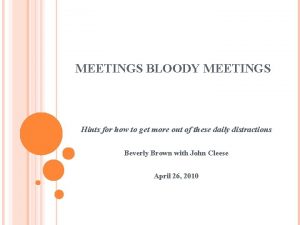American Africans The meetings were held in the
![American Africans The meetings were held in the basement of Wharton Hall […]. When American Africans The meetings were held in the basement of Wharton Hall […]. When](https://slidetodoc.com/presentation_image_h2/17a3d49a0ade499b96213d92b7be9b05/image-1.jpg)
- Slides: 1
![American Africans The meetings were held in the basement of Wharton Hall When American Africans The meetings were held in the basement of Wharton Hall […]. When](https://slidetodoc.com/presentation_image_h2/17a3d49a0ade499b96213d92b7be9b05/image-1.jpg)
American Africans The meetings were held in the basement of Wharton Hall […]. When two new students came for the first time, one from Ghana and the other from Nigeria, Mwonbeki gave them what he called the welcome talk. 5 “[…] You are now in America: do not expect to have hot food for lunch. That African taste must be abolished. When you visit the home of an American with some money, they will offer to show you their house. Forget that in your house back home, your father would throw a fit 1 if anyone came close to his 10 bedroom. […]” They were all laughing. […] “Very soon you will start to adopt an American accent, because you don’t want customer service 2 people on the phone to keep asking you ‘What? ’ You will start to admire Africans who have perfect American accents, like our brother here, Kofi’s parents came from Ghana when 15 he was two years old, but do not be fooled 3 by the way he sounds. If you go to their house, they eat kenkey 4 every day. His father slapped him when he got a C in class. There’s no American nonsense in that house. He goes back to Ghana every year. We call people like Kofi American African, not African American, which is what we call our brothers and sisters whose ancestors were slaves. […] Try and make friends with our African American brothers and sisters in a spirit 20 of true pan-Africanism. But make sure you remain friends with fellow Africans, as this will help you keep your perspective. Always attend 5 African Students Association meetings, but if you must, you can also try the Black Student Union. Please note that in general, African Americans go to the Black Student Union and Africans go to the African Students Association. Sometimes it overlaps 6 but not a lot. The Africans who go to BSU are those with no confidence who are quick 25 to tell you ‘I am originally from Kenya’ even though Kenya just pops out 7 the minute they open their mouths. The African Americans who come to our meetings are the ones who write poems about Mother Africa and think every African is a Nubian queen. ” Chimamanda Ngozi Adichie, Americanah, 2013 1. piquer une crise 5. assister à 2. service client 6. se recouper 3. ne vous fiez pas 7. go out 4. a typical dish in West Africa Chimamanda Ngozi Adichie is a Nigerian novelist. She has written short stories, several novels including Americanah (for which she won the 2013 National Book Critics Circle Fiction award) and the book-length essay We should All Be Feminists (2014). When Adichie was growing up in Nigeria, she was not used to being identified by the colour of her skin. That changed when she arrived in the US to study at university. As a black African in America, she was suddenly confronted with what it meant to be a person of color in the US. She writes about this in her novel Americanah tells the story of a young Nigerian woman, Ifemelu, who immigrates to the US to attend university. The novel traces Ifemelu's life in both countries, threaded by her love story with high school classmate Obinze. A TV miniseries, starring and produced by Lupita Nyong'o, is currently in development.

